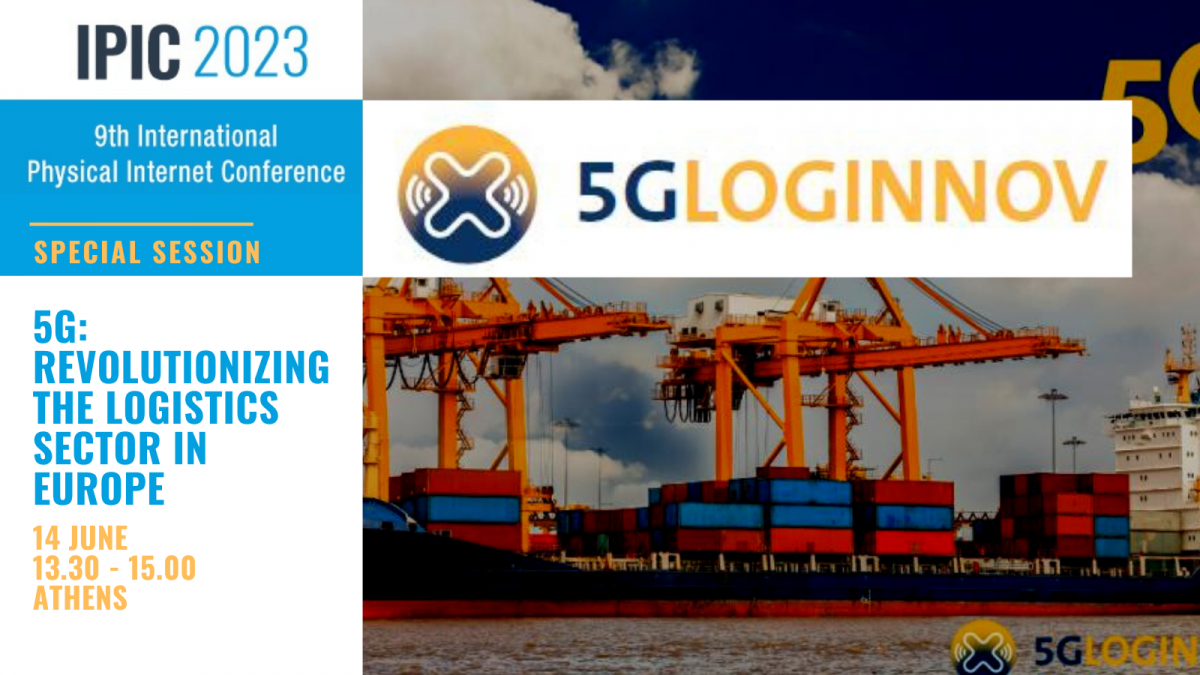5G: revolutionizing the Logistics sector in Europe

14 June | 13.30 - 15.00
Organizer: 5GLOGINNOV project
Session Description
The Physical Internet (PI) is focused on building a more efficient, agile and sustainable logistics system, that draws on different technologies and research areas, such as 5G, the Internet of Things (IoT) and machine learning, with the aim of revolutionizing existing supply chain management and development policies in logistics. 5G technology can play a decisive role towards this direction by providing unprecedented data download (and/or upload) speeds, and improved area coverage, interconnecting a vast number of devices and sensors. Moreover, 5G technology can assure reliable, mission-critical and real-time data exchange and coordination among different 5G-enabled logistics actors, including assets, carriers, shippers, and receivers. The envisioned ecosystem of the “always connected assets and cargo” is oriented towards providing to such a multi-stakeholder community unprecedented visibility on every stage of the logistics supply chain (LSC). Hence, equipping the community with invaluable information that i) facilitates the breakdown of barriers between different logistics systems, ii) improves resource utilization and the efficiency of logistics services, iii) makes provisions on inherent risk mitigation mechanisms, forecasts and agile planning, putting in the center of attention the environmental impact, the energy efficiency and sustainability of the LSC. During the proposed special session, innovative research and innovation (R&I) projects and SMEs will present their results and key achievements on 5G applications related to the Transport and Logistics (T&L) industry. Such applications include 5G&AI-enabled services with impact in personnel (and/or asset) safety or for improving the efficiency of logistics operations, teleoperation scenarios, mission-critical drone communications, real-time telemetry and digital twins fostering the transport digitalization, predictive maintenance, efficient data management schemes focusing on privacy (e.g., via federated learning), just to name a few. In this scope, this special session will host the multi-perspective impact of 5G in T&L, discuss key insights and unique technology enablers (e.g., network slicing, private vs public 5G networks, cloud/edge computing) tailored to the ecosystem’s challenges, focusing also on governance issues and solutions, business aspects and further exploring the prospects of the techno-economic ecosystem in the evolution towards 6G.
Speakers & Agenda
- 5G&AI-enabled services in Port operations tailored to logistics and safety applications, Pavlos Basaras, Project Manager, Institute of Communication and Computer Systems (ICCS)With focus on Maritime transport, logistics, and the Port Industry, we showcase how 5G&AI-enabled services improve the efficiency of logistics operations (e.g., AI-enabled container seal detection, predictive maintenance), including also applications focused on personnel safety (e.g., AI-enabled collision warning system) within the Port area. Following the compute continuum paradigm various AI-service placement options have been considered (extreme-edge and cloud) given the diverse set of requirements of the developed use cases (e.g., latency sensitive, or throughput intensive) over the private 5G NSA network deployed at Piraeus Container Terminal (PCT), in Athens Living Lab.
- AI-assisted 5G systems supporting rail services”, Anna Tzanakaki, Associate Professor, National and Kapodistrian University of Athens.The presentation focuses on the 5G-VICTORI architecture that aims to transform current closed, purposely developed and dedicated infrastructures into open environments were resources and functions are exposed to a variety of vertical industries. It also presents a specific rail use case supported by this architecture and proposes the use of artificial intelligence techniques to facilitate optimal service delivery.
- Autonomous Advanced Air Mobility operations enabled by computer vision methods and 5G connectivity, Christos Skliros, Technical Director - Hellenic Drones S.A. This presentation will discuss the potential of computer vision in autonomous UAV missions. The various architectures regarding the onboard and offboard inference will be discussed. The key role of 5G connectivity will be highlighted in this context. Finally, the future challenges in order to achieve fully autonomous UAV flights will be mentioned.
- 5G&AI enabled real time drowsiness detection, alerting and reporting”, Yannis Kopsinis, Co-Founder and CEO at LIBRA AI Technologies. Studies have shown that employees with drowsiness are 70% more likely to be involved in work-related accidents; and more than the 60% of crane and truck operators continue to work even while having signs of drowsiness or fatigue. In this talk a 5G-enabled unobtrusive drowsiness assessment system will be presented, designed for truck and crane operators in Piraeus Container Terminal. The system relies on advanced ML architecture aiming to offer robust performance with low false alarm rate, operating under hard lighting and stability conditions. At the same time, system is privacy preserving, since no video signal is transmitted out of the driver's cabin.
About IPIC
The IPIC conference series supports the Physical Internet Initiative.
Stay Connected on:
Contact
For general information about the conference, please use our contact form or the contact below:
